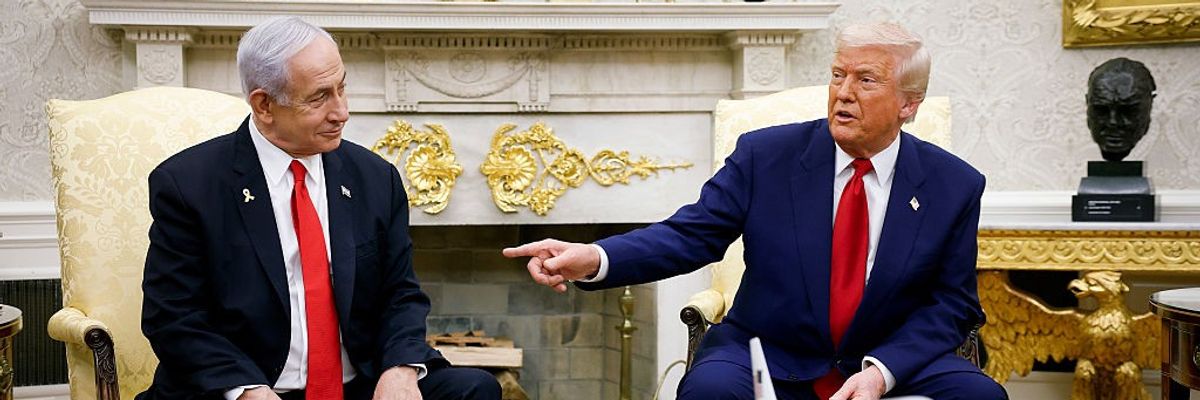Tuesday night reporting on intelligence that Israel is preparing to possibly strike Iranian nuclear facilities, as U.S. President Donald Trump's administration pursues a diplomatic deal with Tehran, sparked calls for the United States to oppose any such attack.
CNN reported on Israel's preparation for a potential strike, citing multiple unnamed U.S. officials who are familiar with the latest intelligence but also "caution it's not clear that Israeli leaders have made a final decision, and that in fact, there is deep disagreement within the U.S. government about the likelihood that Israel will ultimately act."
In a signal of how seriously the international community is taking CNN's reporting, oil prices jumped on Wednesday. According to Barron's: "Brent crude, the global standard, was up 0.9% at $65.95 a barrel. West Texas Intermediate crude gained 1% to $62.63 a barrel. Prices were paring their gains, after initially rising as much as 3%."
While the Israeli Embassy in Washington, D.C. did not comment and CNN is awaiting a response from Israeli Prime Minister Benjamin Netanyahu's office and the U.S. National Security Council, the National Iranian American Council (NIAC) weighed in with a Wednesday statement.
"This is not the first time that Israel is threatening to attack Iran—unilaterally and without justification, to disastrous consequence," said NIAC. "What is of critical importance is ascertaining why Israel's government is making this threat now. More likely than not, the radical Benjamin Netanyahu government sees an opportunity to press the Trump administration to take a hardline position in the Iran nuclear talks that will ensure their collapse and America's movement toward a preventable and disastrous war."
"It should also sharpen choices for the Trump administration," the group continued. "President Trump must take action to course-correct on negotiations aimed at preventing war and Iranian proliferation. The entrenching stalemate has largely been driven by far-reaching American demands that ignore strong alternatives that could weather Iran's own fierce domestic politics."
NIAC stressed that "there is a path to avoiding war, but it will require compromise and making sure that Israel is not leading America into a war that would have disastrous and generational consequences for the U.S. and Middle East as a whole."
Since October 2023, Israel's U.S.-backed assault on the Gaza Strip—the subject of an International Court of Justice genocide case—and American strikes on Yemen have escalated fears of the United States participating more directly in a regional war.
Despite Trump ditching a previous Iran nuclear deal during his first term, his second administration now claims it is aiming to work out a deal. However, whether the two sides can come to a new agreement remains to be seen.
Trump's special envoy, Steve Witkoff,
told ABC News' "This Week" on Sunday that the president "wants to solve this conflict diplomatically and with dialogue, but "we have one very, very clear red line, and that is enrichment. We cannot allow even 1% of an enrichment capability. We've delivered a proposal to the Iranians that we think addresses some of this without disrespecting them."
As
CNN detailed Tuesday, Iranian Supreme Leader Ayatollah Ali Khamenei said he does not expect nuclear talks with the United States to "reach a conclusion" and called the U.S. demand that Iran not enrich uranium a "big mistake." Still, according to Witkoff, there may be another round of negotiations in Europe this week.
Michael Hall, communications manager at the D.C.-based think tank Defense Priorities, suggested that the U.S. government should negotiate directly with Tehran, pointing to contact with the Kremlin, which has included calls between Trump and Russian President Vladimir Putin, and Witkoff's
meeting with Russia's leader—who launched a full-scale invasion of Ukraine in February 2022.
"The U.S. should make clear we are committed to avoiding a war and will not assist in any strike on Iran," Hall
said on social media Tuesday. "If Trump can send Witkoff to Moscow, he can send Witkoff to Tehran. If Trump can call Putin, he can call the ayatollah. A good chance to prove American commitment to diplomacy."




